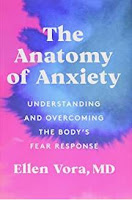Have you seen the news coverage of late regarding youth mental health? Consider “All Children 8 and Older Should be Screened for Anxiety, U.S. Task Force Says” or “’A Cry for Help’: CDC Warns of a Steep Decline in Teen Mental Health.” A somewhat more optimistic view is expressed in “Learning the Right Way to Struggle” which explains how students are encouraged to acknowledge their learning difficulties, for example, saying “I’m in the pit.” There are many, many excellent resources available and below are several new and forthcoming texts which deal with mental health issues. As they invariably note, these books are intended as a supplement rather than replacement for advice from a trained health professional.
THE ANATOMY OF ANXIETY by Ellen Vora provides a unique insight into “Understanding and Overcoming the Body's Fear Response.” Vora, who is board-certified in psychiatry and integrative holistic medicine, begins refreshingly by noting that she is less concerned with making a definitive diagnosis about a specific disorder and “more interested in exploring the particulars of each patient’s life and habits in order to start them down a path to recovery.” Next, she explores the contrast between true (related to an actual event like a death in the family) and false anxiety (perhaps driven by caffeine or sleep patterns) and then describes avoidable and purposeful anxiety in more detail. Later sections of this text explore concepts like techxiety (and social media use), the influence of women’s hormones, and role of diet and food. THE ANATOMY OF ANXIETY is well-written, accessible, and filled with practical suggestions; Vora includes extensive notes and a helpful index.
DON'T WORRY by Shunmyo Masuno, a Zen Buddhist monk and author of The Art of Simple Living, offers 48 Lessons on Relieving Anxiety. It’s worth taking the time to reflect upon these suggestions such as pare down your belongings, cherish the morning, spend 10 minutes a day in nature, or be a good listener. Readers have likely heard these ideas previously, but Masuno gathers them together and offers a two to four page commentary on each. He weaves in references to Zen Buddhism, like the Seven Gifts of Spiritual Dana, and encourages readers to develop a kind heart, practicing generosity and empathy. I can envision potentially using these short readings (one per week) with an Advisory homeroom as a way of reinforcing social emotional learning concepts.
A more specialized text, OVERTHINKING ABOUT YOU by Allison Raskin focuses on “Navigating Romantic Relationships When You Have Anxiety, OCD, and/or Depression.” Raskin, co-host of the Just Between Us podcast, describes her text as “a blend of memoir and self-help.” She writes very conversationally with direct appeals to the reader and even provides trigger warnings for sections which deal with self-harm or body image issues. Although this text would likely be of more interest to students slightly older than ours in high school, Raskin does refer frequently to mental health experts and suggests a number of calming and/or self-reflection exercises. She also includes a list of resources, particularly for those who are part of the LGBTQIA+ community.
THE DEPRESSION TOOLKIT by William J Knaus, Alex Korb and others is designed to provide “Quick Relief to Improve Mood, Increase Motivation, and Feel Better Now.” It actually contains 46 activities grouped into three parts: Find Refuge from Negative Thoughts; Get Unstuck when You’re Down; and Beat Hopelessness and Low Motivation. Within each activity (e.g., Identify Sticky Thoughts or Cope with Change) the authors describe what to know, what to do and/or more to do. Unfortunately, they take a rather authoritarian or prescriptive tone, relying heavily on list making and (painful?) introspection. While some of the exercises may be helpful, it is difficult to imagine a reader (particularly a teen, like our students) being self-motivated enough to follow through. Perhaps this toolkit could work in conjunction with more formal therapy, but with so many relevant resources available, it may be more worthwhile to explore works like The Comfort Book which is less task-oriented.
In anticipation of Mental Health Awareness Month (coming in May), Random House has posted a number of recommended FICTION titles, too, including Glasgow’s How to Make Friends with the Dark.







No comments:
Post a Comment